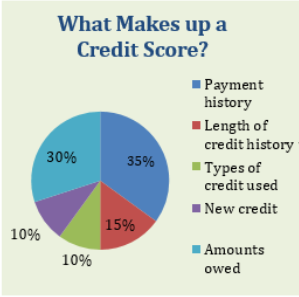Understanding Credit
Credit is offered to a borrower by a lender, also called a creditor.
Creditworthiness is the degree of trustworthiness demonstrated by a borrower, based on how you have historically managed your financial responsibilities.
A credit report provides a snapshot of your creditworthiness and helps lenders calculate the amount of risk they will assume when providing you with access to borrowed funds (i.e., a line of credit).
A credit score is a numerical calculation of how likely a borrower is to repay debt and is based on your financial behavior as reported on your credit report. The higher the consumer’s credit score, the more likely the borrower is to repay the lender.
Credit Reports
The Fair Credit Reporting Act requires each of the three major credit bureaus (Equifax, Experian, and Transunion) to provide consumers with a free copy of their credit report. Credit scores are not found on a credit report. Your credit score will not be affected when obtaining your own credit report.
It is possible that one credit report may differ from another. Review each credit report from each credit bureau and, if there are errors, be sure to correct them. The Federal Trade Commission provides guidance on how to correct inaccurate information or errors.
Errors could include things like:
- incorrect information due to a similar name or Social Security number.
- outdated or inaccurate information, or unresolved credit issues that the consumer thought were resolved.
- open credit accounts that the consumer did not open.
Credit Scores

Virtually all lenders look at credit scores to determine if the borrower will responsibly manage their credit obligations. The most widely used credit scoring system is a FICO score, with scores ranging from a low of 300 to a high of 850. A FICO score is determined by the following criteria:
Payment history – includes the number of accounts paid on time, number of accounts past due (and by how long), accounts in collection, charge-offs, and bankruptcies.
Amounts owed – includes the amount owed, number of accounts with balances, and outstanding balances in proportion to total credit lines.
Length of credit history – refers to the length of time accounts have been opened.
New credit – refers to the number of accounts recently opened, including the number of new credit inquiries.
Types of credit – refers to the types of "mixed" credit reflected on the report and includes things like car loans, credit cards, student loans, mortgages, etc.
What Improves a Credit Score?
- Paying bills on time.
- Having a small outstanding balance in proportion to total credit lines.
- Having a reasonable number of credit cards.
What Hurts a Credit Score?
- Missing payments or failing to pay at least the minimum amount due.
- Having delinquent accounts.
- “Maxing out” your credit cards.
- A short credit history
- Declaring bankruptcy
Review https://www.myfico.com/credit-education/improve-your-credit-score for information on repairing and improving your credit score.
Benefits of Good Credit
Being creditworthy may provide you with easier access to credit. You may also benefit from:
- The ability to purchase a product or obtain a service that may not otherwise be affordable if it had to be paid for upfront.
- It may be easier to rent an apartment, especially if the tenant is likely to pay their rent on time.
- It can be more convenient (or safe) to not carry large amounts of cash.
- The peace of mind that comes from having emergency funds for unexpected expenses.
- Simplified recordkeeping with possibly only one monthly bill.
- Optimal interest rates, terms, and a reduction in the costs associated with loans, credit cards, insurance, and other financial resources.
- Possible travel incentives such as free airline miles, free hotels, or free baggage. Some of these credit card incentives can help cut down on residency interview expenses.
Consequences of Poor Credit
Poor credit may result in several negative consequences. Some examples may include:
- Failing to qualify for the purchase of a home, car, or another “big-ticket” item.
- Paying more for a loan because of higher interest rates and fees.
- Limited opportunities to access different types of financial resources such as loans, credit cards, insurance, etc. or possibly difficulty entering or obtaining contractual agreements.
Tips for Wisely Managing Credit
- Pay your bills on time. This makes up the largest part of your credit score.
- If possible, pay your bill in full each month, or at least pay more than the minimum due. When possible, apply extra payments toward the highest interest rate debt.
- Limit the amount of debt on open lines of credit and limit the number of new lines of credit. Credit inquiries impact credit score.
- Don’t close all your existing accounts or lines of credit. The length of credit history has an impact on your credit score.